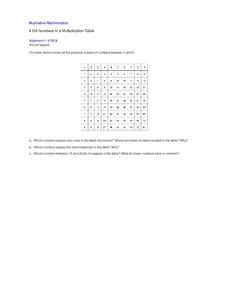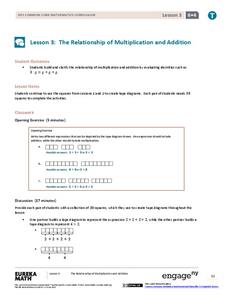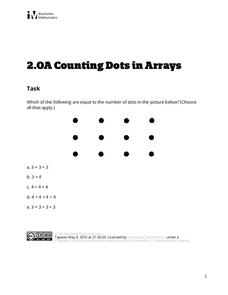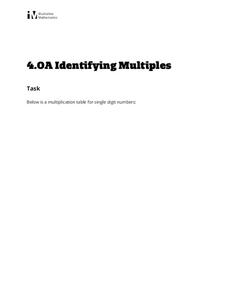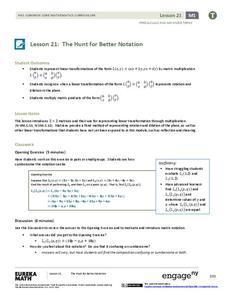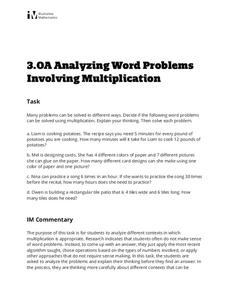Curated OER
Patterns in the Multiplication Table
Explore patterns in the multiplication table in order to deepen your third graders' understanding of this essential skill. Implement this activity as a whole-class lesson, allowing students to work in pairs or small groups to support...
EngageNY
The Relationship of Multiplication and Division
Take any number, multiply it by five, and then divide by five. Did you end up with the original number? In the same vein as the previous lesson, pupils discover the relationship between multiplication and division. They develop the...
Illustrative Mathematics
Numbers in a Multiplication Table
Identifying patterns is a crucial skill for all mathematicians, young and old. Explore the multiplication table with your class, using patterns and symmetry to teach about square numbers, prime numbers, and the commutative and identity...
EngageNY
Discovering the Geometric Effect of Complex Multiplication
Does complex number multiplication have the class spinning? Here's a resource that helps pupils explore and discover the geometric effect of multiplying complex numbers. In the 14th installment in the 32-part unit groups look at the unit...
Los Angeles County Office of Education
Assessment for the California Mathematics Standards Grade 2
Test scholars mathematic skills with an assessment addressing addition, subtraction, multiplication, place value, measurement, geometric shapes, expanded notation; and their ability to compare numbers, write number...
EngageNY
The Relationship of Multiplication and Addition
You know 4 + 4 + 4 = 3(4), but what about x + x + x? Pairs work together to develop equivalent expressions relating multiplication and addition in the third lesson of a 36-part series. They extend their knowledge of multiplication as...
EngageNY
Writing and Expanding Multiplication Expressions
Find out what's so standard about standard form. Scholars learn to write multiplication expressions with variables in the 10th lesson in a series of 36. They use different symbols for multiplication and translate between standard and...
EngageNY
Fraction Multiplication and the Products of Decimals
Class members come up with a hypothesis on the number of decimal digits in the product of two decimals. Learners work in groups to complete several decimal multiplication problems. The results help groups develop a conjecture on the...
EngageNY
Writing and Evaluating Expressions—Multiplication and Division
Don't table the resource on writing expressions for relationships in tables. Scholars investigate relationships between variables and write algebraic expressions involving multiplication and division. These expressions help solve...
EngageNY
Justifying the Geometric Effect of Complex Multiplication
The 14th lesson in the unit has the class prove the nine general cases of the geometric representation of complex number multiplication. Class members determine the modulus of the product and hypothesize the relationship for the...
Los Angeles County Office of Education
Assessment For The California Mathematics Standards Grade 4
Have scholars show what they know with a 20-page assessment aligned to the California State Standards. The test covers concepts such as large and whole numbers, all four mathematical operations, fractions, decimals, geometric figures,...
EngageNY
Matrix Multiplication and Addition
To commute or not to commute, that is the question. The 26th segment in a 32-segment lesson focuses on the effect of performing one transformation after another one. The pupils develop the procedure in order to multiply two 2 X 2...
Illustrative Mathematics
Counting Dots in Arrays
Mathematical arrays can represent several different math skills, including counting groups, multiplication, and even area. In this specific task, learners are asked to identify the addition equations that are equal to a 3 x 4 array....
Los Angeles County Office of Education
Assessment for the California Mathematics Standards Grade 3
Assess scholars' knowledge with a 22-page assessment that covers place value, patterns, probability, estimation, measurement, geometric figures; and their ability to add, subtract, multiply and divide proficiently.
EngageNY
One-Step Equations—Multiplication and Division
Discover one more step to being able to solve any one-step equation. Scholars continue their work with one-step equations in the 28th installment of a 36-part module. Tape diagrams and algebraic processes introduce how to solve one-step...
Mathematics Assessment Project
Middle School Mathematics Test 1
A 13-page test contains two 40-minute sections, which provide word problems and applied analysis to cover material from pre-algebra through geometry.
Curated OER
Symmetry of the Addition Table
Help your class discover the commutative property of addition with this exploration of the addition table. By folding and coloring the table, a symmetry is found that directs learners to an understanding of this crucial mathematical...
Illustrative Mathematics
Identifying Multiples
Administer an activity that fosters a child's understanding of multiples. Young mathematicians are guided to complete three tasks on a multiplication chart. Once they color the boxes with multiples of two, three, and four, learners...
EngageNY
The Hunt for Better Notation
The matrix — it's not just a movie. The lesson introduces the concept of 2 x 2 matrix multiplication as a way to represent linear transformations. Class members determine when a linear transformation represented as matrix...
Illustrative Mathematics
How Many Colored Pencils?
Support young mathematicians' interpretation of place value in order to multiply single-digit numbers by 10. The task builds upon and enhances a learners' understanding of place value, a second grade skill, while introducing...
Illustrative Mathematics
The Locker Game
Here is a learning activity that incorporates a classic puzzle in mathematics. Young mathematicians are guided through a series of statements that describe rounds of pupils opening and closing lockers. The first person opens all 20...
Curated OER
Analyzing Word Problems Involving Multiplication
Learners sometimes have difficulty making sense of a word problem. In a guided learning activity, pupils are asked to think about how to find an answer and explain their thinking, rather than finding the answer. It allows them to...
EngageNY
The Distributive Property and the Products of Decimals
Make multiplication of decimals easier by applying the distributive property. Pupils investigate how they can use the distributive property to multiply decimals. After learning the strategy, they work on some practice problems at...
EngageNY
Writing and Evaluating Expressions—Multiplication and Addition
How many people can sit around a table? The 22nd part in a series of 36 continues the work on writing and evaluating expressions to include expressions with two operations. Pupils use models to determine an expression for the number of...


